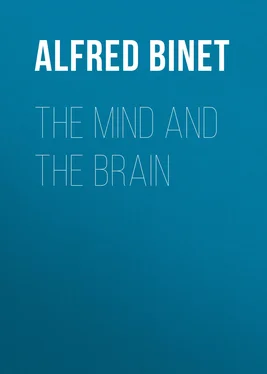Alfred Binet - The Mind and the Brain
Здесь есть возможность читать онлайн «Alfred Binet - The Mind and the Brain» — ознакомительный отрывок электронной книги совершенно бесплатно, а после прочтения отрывка купить полную версию. В некоторых случаях можно слушать аудио, скачать через торрент в формате fb2 и присутствует краткое содержание. Жанр: foreign_prose, foreign_religion, Философия, foreign_psychology, foreign_antique, на английском языке. Описание произведения, (предисловие) а так же отзывы посетителей доступны на портале библиотеки ЛибКат.
- Название:The Mind and the Brain
- Автор:
- Жанр:
- Год:неизвестен
- ISBN:нет данных
- Рейтинг книги:4 / 5. Голосов: 1
-
Избранное:Добавить в избранное
- Отзывы:
-
Ваша оценка:
- 80
- 1
- 2
- 3
- 4
- 5
The Mind and the Brain: краткое содержание, описание и аннотация
Предлагаем к чтению аннотацию, описание, краткое содержание или предисловие (зависит от того, что написал сам автор книги «The Mind and the Brain»). Если вы не нашли необходимую информацию о книге — напишите в комментариях, мы постараемся отыскать её.
The Mind and the Brain — читать онлайн ознакомительный отрывок
Ниже представлен текст книги, разбитый по страницам. Система сохранения места последней прочитанной страницы, позволяет с удобством читать онлайн бесплатно книгу «The Mind and the Brain», без необходимости каждый раз заново искать на чём Вы остановились. Поставьте закладку, и сможете в любой момент перейти на страницу, на которой закончили чтение.
Интервал:
Закладка:
Now, this is not so at all. The conclusion I have enunciated remains entirely sound, notwithstanding this change in the starting point, and for the following reason. It is easy to see that we cannot represent to ourselves the inner structure of matter by using all our sensations without distinction, because it is impossible to bring all these sensations within one single and identical synthetic construction: for this they are too dissimilar. Thus, we should try in vain to unite in any kind of scheme a movement of molecules and an odour; these elements are so heterogeneous that there is no way of joining them together and combining them.
The physicists have more or less consciously perceived this, and, not being able to overcome by a frontal attack the difficulty created by the heterogeneity of our sensations, they have turned its flank. The ingenious artifice they have devised consists in retaining only some of these sensations, and in rejecting the remainder; the first being considered as really representing the essence of matter, and the latter as the effects of the former on our organs of sense; the first being reputed to be true, we may say, and the second being reputed false—that is subjective, that is not representing the X of matter. 12 12 See p. 18 , sup. —Ed.
I have refuted this argument by showing that all our sensations without exception are subjective and equally false in regard to the X of matter, and that no one of them, consequently, has any claim to explain the others.
Now, by a new interpretation; we are taught that all sensations are equally true, and that all faithfully represent the great X. If they be all equally true, it is absolutely the same as if they were all false; no one sensation can have any privilege over the others, none can be truer than the others, none can be capable of explaining the others, none can usurp to itself the sole right of representing the essence of matter; and we thus find ourselves, in this case, as in the preceding, in presence of the insurmountable difficulty of creating a synthesis with heterogeneous elements.
All that has been said above is summed up in the following points:—
1. Of the external world, we only know our sensations. All the physical properties of matter resolve themselves for us into sensations, present, past, or possible. We may not say that it is by the intermediary, by the means of sensation, that we know these properties, for that would mean that the properties are distinct from the sensations. Objects are to us in reality only aggregates of sensations.
2. The sensations belong to the different organs of the senses—sight, hearing, touch, the muscular sense, &c. Whatever be the sense affected, one sensation has the same rights as the others, from the point of view of the cognition of external objects. It is impossible to distinguish them into subjective and objective, by giving to this distinction the meaning that certain sensations represent objects as they are, while certain others simply represent our manner of feeling. This is an illegitimate distinction, since all sensations have the same physiological condition, the excitement of a sensory nerve, and result from the properties of this nerve when stimulated.
3. Consequently, it is impossible for us to form a conception of matter in terms of movement, and to explain by the modalities of movement the properties of bodies; for this theory amounts to giving to certain sensations, especially those of the muscular sense, the hegemony over the others. We cannot explain, we have not the right to explain, one sensation by another, and the mechanical theory of matter has simply the value of a symbol.
BOOK II
CHAPTER I
THE DISTINCTION BETWEEN COGNITION 13 13 See [Note 3] , sup. on p. 15 .—Ed.
AND ITS OBJECT
After having thus studied matter and reduced it to sensations, we shall apply the same method of analysis to mind, and inquire whether mind possesses any characteristic which allows it to be distinguished from matter.
Before going any further, let me clear up an ambiguity. All the first part of this work has been devoted to the study of what is known to us in and by sensation; and I have taken upon myself, without advancing any kind of justifying reason, to call that which is known to us, by this method, by the name of matter, thus losing sight of the fact that matter only exists by contra-distinction and opposition to mind, and that if mind did not exist, neither would matter. I have thus appeared to prejudge the question to be resolved.
The whole of this terminology must now be considered as having simply a conventional value, and must be set aside for the present. These are the precise terms in which this question presents itself to my mind. A part of the knowable consists in sensations. We must, therefore, without troubling to style this aggregate of sensations matter rather than mind , make an analysis of the phenomena known by the name of mind, and see whether they differ from the preceding ones. Let us, therefore, make an inventory of mind. By the process of enumeration, we find quoted as psychological phenomena, the sensations, the perceptions, the ideas, the recollections, the reasonings, the emotions, the desires, the imaginations, and the acts of attention and of will. These appear to be, at the first glance, the elements of mind; but, on reflection, one perceives that these elements belong to two distinct categories, of which it is easy to recognise the duality, although, in fact and in reality, these two elements are constantly combined. The first of these elements may receive the generic name of objects of cognition, or objects known, and the second that of acts of cognition.
Here are a few examples of concrete facts, which only require a rapid analysis to make their double nature plain. In a sensation which we feel are two things: a particular state, or an object which one knows, and the act of knowing it, of feeling it, of taking cognisance of it; in other words, every sensation comprises an impression and a cognition. In a recollection there is, in like manner, a certain image of the past and the fact consisting in the taking cognisance of this image. It is, in other terms, the distinction between the intelligence and the object. Similarly, all reasoning has an object; there must be matter on which to reason, whether this matter be supplied by the facts or the ideas. Again, a desire, a volition, an act of reflection, has need of a point of application. One does not will in the air, one wills something; one does not reflect in the void, one reflects over a fact or over some difficulty.
We may then provisionally distinguish in an inventory of the mind a something which is perceived, understood, desired, or willed, and, beyond that, the fact of perceiving, of understanding, or desiring, or of willing.
To illustrate this distinction by an example, I shall say that an analogous separation can be effected in an act of vision, by showing that the act of vision, which is a concrete operation, comprises two distinct elements: the object seen and the eye which sees. But this is, of course, only a rough comparison, of which we shall soon see the imperfections when we are further advanced in the study of the question.
To this activity which exists and manifests itself in the facts of feeling, perceiving, &c., we can give a name in order to identify and recognise it: we will call it the consciousness 14 14 The word " conscience " is one of those which has been used in the greatest number of different meanings. Let it be, at least, understood that I use it here in an intellectual and not a moral sense. I do not attach to the conscience the idea of a moral approbation or disapprobation, of a duty, of a remorse. The best example to illustrate conscience has, perhaps, been formed by Ladd. It is the contrast between a person awake and sleeping a dreamless sleep. The first has consciousness of a number of things; the latter has consciousness of nothing. Let me now add that we distinguish from consciousness that multitude of things of which one has consciousness of. Of these we make the object of consciousness. [ Conscience has throughout been rendered "consciousness."—Ed.]
( la conscience ), and we will call object everything which is not the act of consciousness.
Интервал:
Закладка:
Похожие книги на «The Mind and the Brain»
Представляем Вашему вниманию похожие книги на «The Mind and the Brain» списком для выбора. Мы отобрали схожую по названию и смыслу литературу в надежде предоставить читателям больше вариантов отыскать новые, интересные, ещё непрочитанные произведения.
Обсуждение, отзывы о книге «The Mind and the Brain» и просто собственные мнения читателей. Оставьте ваши комментарии, напишите, что Вы думаете о произведении, его смысле или главных героях. Укажите что конкретно понравилось, а что нет, и почему Вы так считаете.












